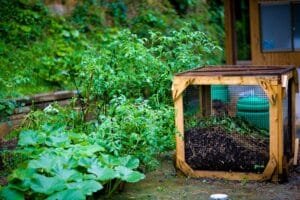Urban Composting: A Conversation & Beginner’s Guide

I’m lucky when it comes to composting. I have a few acres in the country. Enough to have two bins and lots of garden to put compost in.
But I wondered how I would approach it if I were in an urban area or an apartment.
Composting sounds simple. Toss your food scraps in a bin, and let nature do her thing. But anyone who’s tried it knows the reality can be a little messier.
Today, Motley the goat is revealing what works and what doesn’t. And whether it’s possible to compost in an apartment without making enemies of your neighbours.
The Motley Goat takes on composting.
Disclaimer: The facts are true. The interview is fictional. (There isn’t a talking goat.)

Interviewer: So, let’s start with the basics. Why did you decide to help people compost at home?
Motley: I know that humans throw food scraps in the trash. Even though they’ll end up in a landfill, where they won’t break down properly. Composting is a simple way to cut down on waste. And I wanted to discuss ways they can make it work without turning their kitchens into a fruit-fly paradise.
Composting Set-ups
Interviewer: What kind of setup do you suggest?
Motley: There are a few systems. I’d use a countertop bin with a charcoal filter for daily scraps. And then empty it into a backyard compost bin every few days.
I’m also fascinated with worm bins for winter composting. Yes, Vermicomposting. Worms in the house! And no, it’s not as horrifying as it sounds! But you are caring for worms, so check out what it entails before you commit.
Interviewer: Be honest. Does it smell?

Motley: Only if you mess up. The trick is balancing greens (like fruit and veggie scraps) with browns (like shredded paper or leaves). If it smells, it’s too wet or has too many food scraps. When that happens, add more browns, mix them, and the problem will go away. When it’s working, the worm bin smells like fresh dirt. Surprisingly pleasant.
Interviewer: Don’t you have to have a “worm rodeo” and catch all the worms before you can use your compost?
Motley: Yes. They have to be separated every 3 to 6 months. The easy method – lights. There are some great videos on worm composting.
Composting Disasters
Interviewer: Any disasters?
Motley: Oh, a few! The worst was probably when I added too many melon rinds in the summer and opened the bin to a swarm of fruit flies. Lesson learned: always bury the scraps under a layer of dry material!
In Apartments
Interviewer: What about people who live in apartments? Can they compost without a backyard?
Motley: Absolutely! There are a few options. A small bokashi system is great because it ferments scraps instead of breaking them down traditionally. There’s no smell, no bugs, and you can do it right under your sink.
Worm bins work well in apartments as long as you keep them balanced. Some cities also have food waste collection programs or drop-off spots for composting.
Interviewer: What’s the biggest challenge for apartment composters?
Motley: Space and convenience. If you don’t have a balcony or a community compost bin nearby, it can be tricky.
Bokashi is great because it doesn’t take up much room, but you still need somewhere to bury the fermented scraps once the process is done.
Some people team up with local gardens or farms to donate their compost. I give some away as gifts.
Is Composting Worth It?
Interviewer: So, is composting worth it?
Motley: 100% yes! Even with a few hiccups along the way, it’s satisfying to see waste turn into something useful instead of going to the landfill. Plus, my plants love the finished compost. If you eat food, you make food waste. Composting gives it a better ending.
